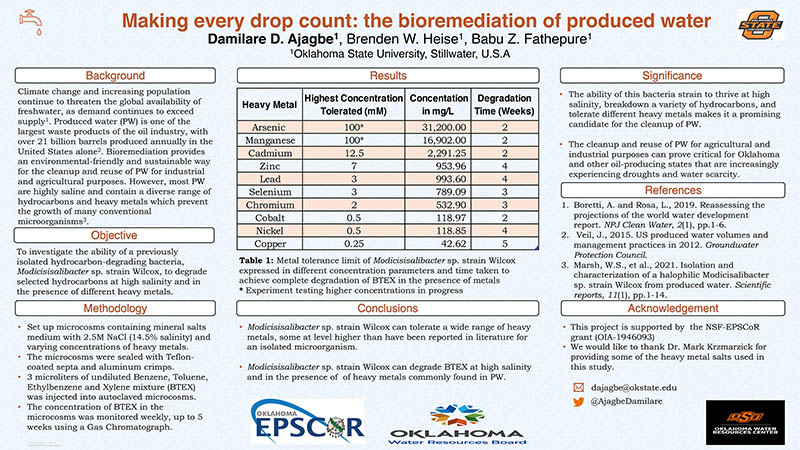
Hover to pan and click to magnify. Click again to pan at full screen.
Damilare D. Ajagbe1, Brenden W. Heise1, Babu Z. Fathepure1
Damilare D. Ajagbe1, Brenden W. Heise1, Babu Z. Fathepure1
1 Department of Microbiology and Molecular Genetics, Oklahoma State University, Stillwater, U.S.A
ABSTRACT:
Produced water (PW) is one of the largest waste products of the oil industry, with over 21 billion barrels produced annually in the United States alone. Current disposal options, such as deep-well injection, have the potential to pollute subsurface water and cause frequent seismic activity. Given the global increase in water scarcity and drought, PW can be reused in agriculture or industry if properly cleaned. However, most PW are highly saline and contain a diverse range of hydrocarbons and heavy metals which prevent the growth of many microorganisms. Hence, organisms able to tolerate multiple stressors and utilize hydrocarbons as a carbon source for growth are required for PW bioremediation. Recently, we have isolated a hydrocarbon-degrading bacteria, Modicisisalibacter sp. strain Wilcox in hypersaline conditions and in the presence of a range of toxic heavy metals. We have setup microcosms to study the strain’s ability to degrade petroleum compounds such as benzene, toluene, ethylbenzene and xylene (BTEX) in mineral salts medium containing 2.5M NaCl and varying heavy metal concentrations. The degradation of BTEX was analyzed periodically using a gas chromatograph. So far, the results show that strain Wilcox can tolerate a wide range of heavy metals such as arsenic, cadmium, lead, zinc, nickel, cobalt, and chromium, and degrade BTEX in the presence of these metals, even at concentrations higher than most of those reported in existing literature. The ability of this bacteria strain to thrive at high salinity, breakdown a variety of hydrocarbons, and tolerate various heavy metals at concentrations far above the permissible limits makes it a promising candidate for the cleanup of PW.

DISQUS COMMENTS WILL BE SHOWN ONLY WHEN YOUR SITE IS ONLINE